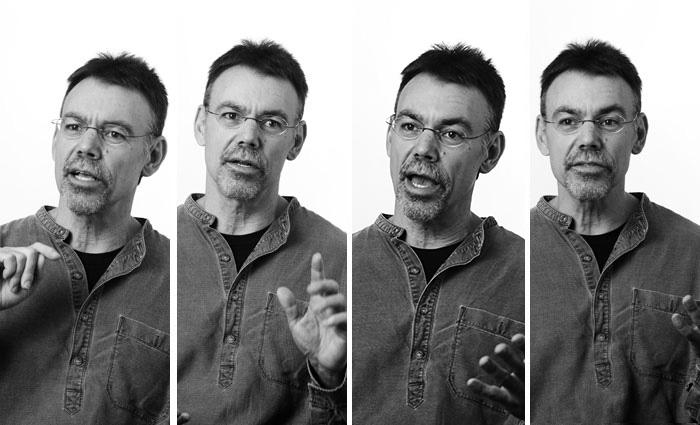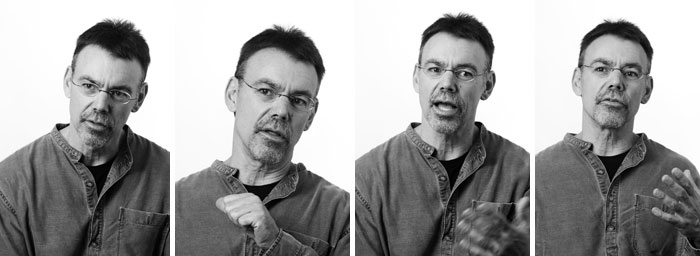Mike Roberts

Focus on Faculty
by Christine Baksi
Associate Professor of Biology Mike Roberts discusses cancer research and what it means to educate the next generation of cancer killers.
Last month, you and your students presented a poster at the American Association of Cancer Research (AACR) in San Diego. After full days of presentations on landmark discoveries, how did you frame the dinner conversations?
This meeting features talks by leaders in all sub-disciplines of cancer biology from around the world. It is inspiring and gratifying to be a part of it. This was the basis of our conversations; we talked about how the questions we are asking related to the talks we heard and how the new approaches described might be applied to our research. We discussed the new directions in cancer research and the conference themes that defined the 2014 meeting. Cancer immunotherapy, Science magazine’s 2013 “Breakthrough of the Year,” was the meeting's focus, and we talked a lot about the promise of this research in providing effective new treatments for currently incurable advanced cancers.
Targeted therapies are the latest trend in cancer research. How are academia and industry working collaboratively toward progress?
It is remarkable how academia and industry have joined forces in the last five to 10 years to accelerate drug discovery. The identification of deregulated pathways in cancer is basic research that has come largely from academia. This work has identified the possible drug targets. In return, pharmaceutical and biotechnology companies have screened enormous libraries of drug compounds for “hits” affecting those targets and provided academic-research laboratories with the compounds for testing in cancer cell lines and animal models. The two sectors have collaborated in conducting human clinical trials, which are costly and time consuming, to bring new drugs to patients. This type of effort, often referred to as “translational” or “bench-to-bedside” research, could not occur without this partnership.
In terms of research, how do you define talent and recognize it in your students?
I believe there are two kinds of talent that successful scientists need to possess. There are technical skills that must be mastered in order to perform experiments successfully, and these skills go beyond being careful and precise. Having “good hands” in the lab is a fitting sports analogy, and this requires some innate ability but also can be developed with practice. The other kind of talent has to do with passion and creativity. This can possibly be inspired but cannot be taught and is much more personal. My science heroes have all been passionate about finding answers to their research questions and have been creative in their approaches; these individuals include professors, colleagues and students with whom I have worked. The most talented student co-researchers I have known were fully invested in their projects and really needed to know the answers to our research questions. Spotting intellectual curiosity and that “need to know” in students often occurs during the courses I teach.

In what ways is Dickinson making meaningful contributions to cancer research?
The recent AACR annual meeting illustrated for me how we are contributing to cancer research in several important ways. I received an e-mail two days before the meeting from the vice president of research at a pharmaceutical company in California who read our abstract and wanted to meet with me to discuss our results. We met and exchanged information and ideas about our common projects. In addition, we had dozens of visitors who were working on related questions review our poster and provide positive feedback.
Additionally, Rizwan Saffie '14 and Reed Salmons '14 confidently and commendably presented our work, furthering their training for careers in cancer related fields. Rizwan will enter the cancer biology Ph.D. program at the University of Pennsylvania this fall. Reed is considering a career in pediatric oncology and planning to attend medical school in the fall of 2015. Finally, on our last day at the meeting, I spotted a former research student, Ben Boyerinas ’03; running into him was fairly remarkable given that there were 18,000 cancer researchers at the conference. Ben completed his Ph.D. in cancer biology at the University of Chicago and is currently at the National Cancer Institute conducting groundbreaking research in cancer immunotherapy.
The importance of basic scientific discoveries, however minor they may seem at the time, cannot be overlooked. Dickinson has played a meaningful role in making small but significant research contributions while positioning students to pursue careers in cancer fields and to make new discoveries.
Further Reading:
Hanahan, D., and Weinberg, R.A. (2011). The hallmarks of cancer; the next generation. Cell 144, 646-674.
“Stronger, Not Sicker” a Nature video on cancer immunotherapy. (2014). http://www.nature.com/nature/outlook/cancer-immunotherapy/#video
Fishburn, C.S. (2013). Translational research: the changing landscape of drug discovery. Drug Discovery Today 18, 487-494.
Read more Focus on Faculty profiles.
Photos by Carl Socolow '77, Video by Joe O'Neill
Published May 8, 2014